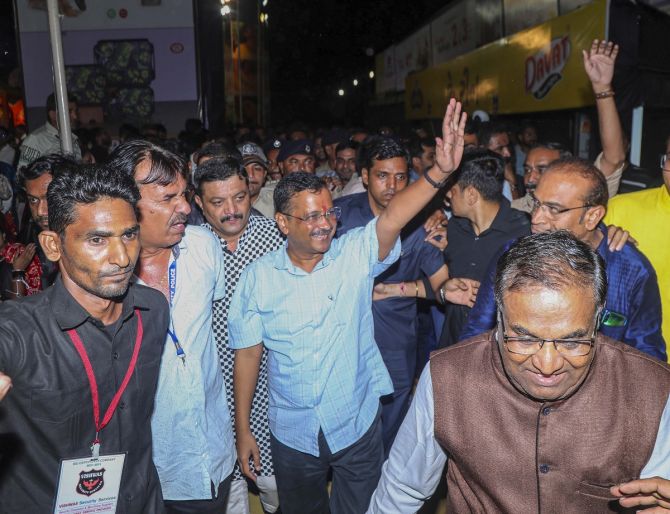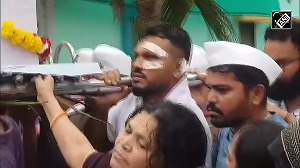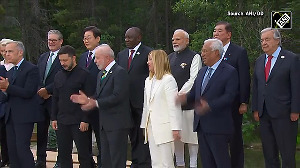'If he loses Gujarat, then he has a major, major, problem coming up in 2024.'

Senior journalist R K Misra, an avid observer of politics in Gujarat, offers his insights into how the Bharatiya Janata Party, Congress and the Aam Aadmi Party are likely to fare in the assembly election in the state.
The assembly electionsin Gujarat is all set for a grand showdown as AAP positions itself as an alternative to the BJP as well as the Congress in a state, which has been under BJP rule since 1995.
The two-phase election slated for December 1 and 5 will see 182 seats up for grabs between the three main contenders. The election results will be announced on December 8.
"If by any chance, even if the BJP loses Gujarat, it will still form the government in Gujarat," Misra tells Prasanna D Zore/Rediff.com in the first of a two-part interview.
Is the BJP all set for yet another term in office in Gujarat?
One shouldn't be jumping to conclusions. This seems to be the obvious implication of how things are happening (in Gujarat today). But it's too early to say at this point of time before the lists of candidates is out (The interview was conducted before the BJP announced its two lists of candidates).
The BJP this time is facing a piquant situation.
Is AAP emerging as an alternative to the Congress in Gujarat?
I'll have to go a little into the background before I come back to answer your question.
Gujarat has traditionally been a straight fight between the Congress and the BJP earlier and then between the BJP and Congress.
At various points of time, powerful regional leaders have dissociated from either of the parties and set up regional parties. Most of them came a cropper when it came to (winning) elections.
Chimanbhai Patel was one of the earlier ones, a very powerful leader with the Congress. Post the Navnirman agitation in 1975 he moved out and formed the regional party called the Kisan Mazdoor Lok Party, and was not very successful.
And later, through a very circuitous route, he went back to the Congress.
Then you take the case of Shankersinh Vaghela who rebelled against the BJP in 1995, formed a regional party and contested the elections and fell flat on his face. He then joined the Congress, left the Congress and now (in November 2022) his son has joined the Congress again.
Then the first chief minister of the BJP and party veteran Keshubhai Patel formed the Gujarat Parivartan Party with the same result.
So, regional parties have by and large, not been very successful in Gujarat.
Now comes the AAP... There is a history to how AAP landed up in Gujarat.
Earlier, AAP was planning to contest the elections in Gujarat, but not in a big way. It wanted to use this opportunity to set up its organisational infrastructure in the state.
But after it won Punjab it started concentrating on Himachal Pradesh because it was looking at winning the contiguous landmark across Punjab, Delhi, Himachal Pradesh and Haryana.
When it was concentrating on HP it had problems as the BJP weaned away its office bearers. And then with Satyender Jain, the health minister of Delhi who was handling Himachal, picked up by the ED (Enforcement Directorate), AAP's efforts in HP started floundering.
Obviously, the BJP under Modi started looking at AAP more closely after its Punjab victory.
Now, these tactics by the BJP made AAP review its entire strategy. They realised that they would have a lot of problems because the BJP has started aiming at them. And therefore, to fend them off, they decided to beard the lion in his own den. As a result they are now focusing on Gujarat with all their might.

Many analysts make out the case that AAP's entry in Gujarat would work to BJP's benefit.
Initially, the BJP was happy because AAP's entry in Gujarat would cut into the Congress' vote base. Therefore, the BJP supported it as, for the BJP, wiping out the Congress has always been the first priority, in terms of not only electoral battles, but also in terms of culture or a polity.
If you have to remove the history of the Congress from the national political landscape, and create another alternative or political theory or a philosophy, wiping out the Congress becomes important in this line of things.
So initially, when AAP moved into Gujarat, they were fending around, looking around in rural areas, and that made the BJP happy because, that was likely to cut into the Congress vote base, which has been seen in a line of sequence that they have been going the whole hog in areas where the Congress has been there.
But when they (AAP) started moving from the rural areas towards the urban areas is when the BJP/Narendra Modi realised that they had trouble on their hands. So they started concentrating more intensely on AAP. That is when the BJP started scalloping them, targeting them.
Do you remember that very famous revdi (freebies) culture remark of the prime minister? That was a point of consternation for the BJP, for the simple reason that any record that AAP had in Gujarat was only in the urban areas.
It (AAP) had walked into the Surat Municipal Corporation last year by winning 27 seats and wiping out the Congress; the BJP won 93 of the 120 seats. AAP's next foray was in the Gandhinagar Municipal Corporation where it won only one seat.
Till now in Gujarat the Congress always had an advantage (in the GMC,) but the BJP would come to power through defections. But this time the BJP won 41 of the total 44 seats and the Congress was reduced to two seats.
But the net result of this was that the Congress and AAP's votes taken together were much higher than the BJP's.
While the BJP was happy the Congress was getting decimated, as AAP's campaign began to move towards urban areas the BJP realised that it would cut more into their vote base.
The revdi culture remark was the beginning of a part of a rethink in which AAP started leading the narrative all along -- whether at the national level or at the state level. Ever since Modi caught onto the levers of power, he has been on a spree to decimate the Congress.
Suddenly, what happens is that somebody comes in and starts using Modi's style and thought process against the BJP and Modi. Since 2014 Modi has always been leading the narrative.
If you see every election in Gujarat or even at the national level, something pops out. Just when the elections are coming very close to the voting point the whole scene changes.
But in this case, what is happening is, the revdi culture remark has been turned around by Arvind Kejriwal and he has started leading the narrative, forcing the major people (in the BJP) to answer.
This time Arvind Kejriwal has emerged as the aggressor – just like Modi since 2014 – and has been making the BJP defend its remarks.
The AAP has basically nothing much to lose in Gujarat. If it does well, fine; if it doesn't then at least it would have raised Kejriwal to the level of Narendra Modi's main competitor on the national stage.
Today, Kejriwal is leading the narrative and nobody in the BJP except for Modi has the capacity or the strength to counter that narrative. What is happening in the process is that Kejriwal is seen as someone who is standing up to Modi. Kejriwal is planning to make himself look taller with 2024 (Lok Sabha elections) in mind.

Given this scenario where the BJP seems to be on the back foot, do you give the BJP another chance at the hustings?
Let's put it straight. the BJP, in Gujarat, and at the national level, is nothing but Narendra Modi. All others (BJP leaders) are either his subordinates in the party structure or in the government.
Narendra Modi is the government; Narendra Modi is the party.
Modi micro-manages Gujarat. Gujarat elections are being fought in the name of Modi and he is telling the people 'You look at me and vote'. Everyone else in the BJP is either attending to errands or to the infrastructure and things like that.
Since September 20 to November 1, he has made five trips (to Gujarat) spending anywhere between one to three days. And if we look at the last month, on the back of the envelope calculation, he has laid the foundation stones, announcements, inaugurations of virtually about Rs 2 lakh crore.
And this does not include the 451 MOUs worth Rs 1.53 lakh crore signed at the Defence Expo (in October 2022) in Gandhinagar.
The flavour of the last six months has been Gujarat. Everything is (happening in) Gujarat whether it is national conferences or IAS probationers' meetings or even foreign dignitaries (visiting India) have been travelling to Delhi via Gujarat.
Elections have always been on the mind of the prime minister and he uses every itinerary to his advantage.
Therefore, the surmise is that Modi cannot, and I repeat, cannot afford to lose Gujarat.
If he loses Gujarat then he has a major, major, problem coming up in 2024 in the next Parliamentary election.
If he loses Gujarat, then it will be a huge dent on his national image.
Modi's plans to come to power (at the Centre) for a third time would be badly dented if he loses Gujarat. But if the BJP wins Gujarat, then Modi has done it. And if by any chance, even if the BJP loses Gujarat, it will still form the government in Gujarat.
What prevents 10 MLAs from any party from resigning?
In Gujarat, the Opposition (the Congress till now) has always been losing MLAs (to the BJP) after elections.
In 2017, 11 Congress MLAs joined BJP. At 99, the BJP was well above the 92 mark needed, but yet to consolidate their position and make the government safe, so they (the BJP) took the figure up to 111.
If you follow all this in the right manner, then you will understand what is likely to unfold (after the 2022 Gujarat assembly election results are announced).











